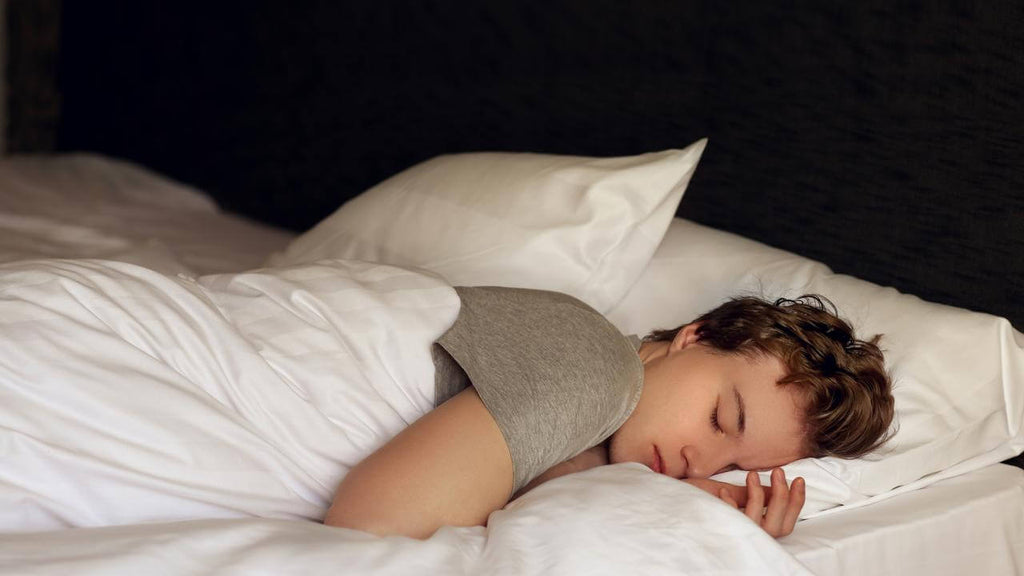Hypersomnia is a sleep disorder that is characterized by excessive daytime sleepiness. People with Hypersomnia often find it challenging to stay awake during the day, even if they have had enough sleep at night.
Other symptoms of Hypersomnia include fatigue, difficulty concentrating, and memory problems. Hypersomnia can be caused by various factors, including sleep deprivation, stress, medications, and medical conditions.
Treatment for Hypersomnia typically involves lifestyle changes, such as getting more sleep and reducing stress, along with medications or therapy.
What Are The Different Types Of Hypersomnia?
Hypersomnia is classified as primary and secondary.
There are four Secondary types of Hypersomnia: Idiopathic Hypersomnia, narcolepsy type 1, narcolepsy type 2, and Kleine-Levin syndrome.
Narcolepsy Type 1
Cataplexy is a sort of narcolepsy caused by having a low level of hypocretin (also known as orexin) in the brain and spinal fluid.
Daytime naps are generally fewer and more refreshing than daytime naps in other types of hypersomnolence. Sleep Paralysis and Hallucinations are familiar with Narcolepsy type 1. It mainly affects people aged between 10 to 25.
Narcolepsy Type 2
Cataplexy is not a feature of this form of narcolepsy. Narcolepsy type 2 has milder symptoms and hypocretin levels within normal limits. Narcolepsy type 2 generally begins during adolescence.
Idiopathic Hypersomnia
It is the most common type of Hypersomnia, characterized by excessive daytime sleepiness that does not have a clear cause.
Kleine-Levin Syndrome
It is a rare sleep disorder characterized by periods of excessive sleepiness followed by periods of normal alertness. It generally occurs with mental, behavioural, and even psychiatric problems.
Each episode can last 10 days to a few weeks, with some episodes lasting for months to years and recurring regularly. During an episode, you have average attention and cognitive function. It mainly affects young males.
Episodes become less frequent over time, usually between eight and 12 years.
Three leading causes of Secondary Hypersomnia lead to excessive sleep:
Alcohol And Medication Withdrawal
Several medications, such as antidepressants, anti-hypertensive drugs, skeletal muscle relaxants, cannabis, and alcohol, lead to Hypersomnia.
Insufficient Sleep Syndrome
You might have Hypersomnia if you don't get enough sleep, so you're not sleeping for seven to nine hours (for adults). You may not be doing everything possible to obtain adequate rest.
Medical Condition
Obstructive sleep apnea, Parkinson's disease, epilepsy, delayed sleep phase syndrome, bipolar disorder, and Seasonal Affective Disorder are some medical conditions that lead to Hypersomnia.
Is Narcolepsy The Same As Hypersomnia?
No, there is a considerable difference between Hypersomnia and narcolepsy. Narcolepsy causes sudden and inevitable sleep attacks during the daytime.
However, under Hypersomnia, people feel fatigued but do not experience sleep attacks. They can stay awake during the day.

Who Gets Hypersomnia?
Hypersomnia is more common in females than males. It affects about 5% of the population, according to current thinking. It's generally diagnosed in adolescence or early adulthood (17 to 24 years old).
What Are The Causes Of Hypersomnia?
There are many known causes of Hypersomnia. People can experience Hypersomnia due to lack of sleep, stress, medications, or certain medical conditions.
Lack of sleep is the most common cause of Hypersomnia and is often caused by a person's lifestyle habits or work schedule. When people do not get enough sleep, they often experience excessive daytime sleepiness.
Stress is another common cause of Hypersomnia. When people are under a lot of stress, they can often find it challenging to stay awake during the day.
Medications can also cause Hypersomnia. Many medications, including antidepressants, anti-anxiety, and sleeping pills, can lead to excessive daytime sleepiness.
Medical conditions can also cause Hypersomnia.
Some medical conditions, such as kidney failure, sleep apnea, and chronic fatigue syndrome, can lead to excessive daytime sleepiness.
Some other listed causes of Hypersomnia are:
- Obesity or overweight
- Prescription drugs like antihistamines or tranquilizer
- Depression
- Sleep apnea and sleep disorders such as narcolepsy
- Genetics (Hypersomnia running into blood relatives)
- Alcohol abuse

What Are The Signs And Symptoms Of Hypersomnia?
The most common symptom of Hypersomnia is excessive daytime sleepiness. People with Hypersomnia often find it challenging to stay awake during the day, even if they have had enough sleep at night.
Other symptoms of Hypersomnia include fatigue, difficulty concentrating, and memory problems.
Other symptoms may include:
- Hallucinations
- Headaches
- Decreased energy
- Loss of appetite
- Irritability
- Anxiety
- Slow speech and slow thinking
- non-restorative and unrefreshing daytime naps
- recurrent extreme
How Is Hypersomnia Treated?
There is no one-size-fits-all treatment for Hypersomnia. Treatment for Hypersomnia typically involves lifestyle changes, such as getting more sleep and reducing stress, along with medications or therapy.
- Lifestyle changes are often the first line of treatment for Hypersomnia. People with Hypersomnia should aim to get at least eight hours of sleep each night and reduce stress.
- Medications can also be used to treat Hypersomnia. Several medications are available that can help people stay awake during the day.
- Therapy can also help treat Hypersomnia. Therapy can help people learn better sleep habits and manage stress levels.
How is Hypersomnia diagnosed?
Hypersomnia can be diagnosed based on your symptoms and Medical history. Your doctor may also order a sleep study to help diagnose the disorder.
The sleep study is a test that measures how well you sleep and the types of activities that occur during sleep.
Your doctor may also request various tests, such as blood tests, computerized tomography (CT) scans, and a sleep test called polysomnography. In some situations, an additional electroencephalogram (EEG), which records the electrical activity in the brain, is required.
Several tests can diagnose Hypersomnia, including the Epworth Sleepiness Scale, the Stanford Sleepiness Scale, and the Multiple Sleep Latency Test. The Epworth Sleepiness Scale is a questionnaire that asks how likely you are to fall asleep in different situations.
A polysomnography test measures muscle movements, brain waves, heart rhythms, and breathing patterns during sleep. A trained sleep specialist can conduct this test at a sleep study centre, hospital, or any other designated site to conduct the test.
The Stanford Sleepiness Scale is a questionnaire that asks how sleepy you feel during the day. The Multiple Sleep Latency Test is a test that measures how quickly you fall asleep during a nap.
Multiple Sleep Latency test measures the tendency of the person to fall asleep during the daytime with five 20-minute naps scheduled after every 2 hours. This test measures brain activity and REM sleep for the number of naps.
Based on the symptoms and signs, you will be diagnosed with Hypersomnia:
- Struggling with Hypersomnia three times a week for over three months.
- Falling asleep several times a day
- Not feeling refreshed even after 9 hours of sleep.
- Hypersomnia causes excessive mental stress and impairment in work, social and other areas.

What Are The Complications Associated With Hypersomnia?
Several complications can occur due to Hypersomnia. The most common complication is excessive daytime sleepiness, leading to problems at work or school, car accidents, and other safety risks.
Other complications associated with Hypersomnia include:
- Fatigue
- Difficulty concentrating
- Memory problems
- Depression
- Weight gain
- Sleep apnea
How Can Hypersomnia Be Prevented?
There is no known way to prevent Hypersomnia. However, following good sleep habits and reducing stress can help reduce the disorder's symptoms. It is also essential to get treatment for any underlying medical conditions causing Hypersomnia.
Here are some recommended lifestyle changes that one needs to deal with Hypersomnia:
- Maintaining a regular sleep schedule.
- Limiting the alcohol intake
- Restrict the caffeine at least 4-5 years before sleeping
- Keep your bedroom cosy.
- If you are on medication, consult your doctor if any medicine causes drowsiness.

Who Is At Risk For Hypersomnia?
Anyone can develop Hypersomnia, but some people are at a higher risk for the disorder. Females are generally at a higher risk than males. It is also prevalent among young adults and adolescents.
FAQs
Now that you know all about hypersomnia, let’s take a look at a few frequently asked questions.
Does Depression Cause Hypersomnia?
Depression can cause Hypersomnia, particularly in people who have difficulty sleeping at night. People with depression often experience excessive daytime sleepiness.
Can Hypersomnia Be Cured?
There is no known cure for Hypersomnia. However, treatment typically involves lifestyle changes and medications to help reduce the disorder's symptoms.
Can Hypersomnia Be Fatal?
There is no known way to die from Hypersomnia. However, excessive daytime sleepiness can lead to car accidents and other safety risks.
Wrap Up!
Hypersomnia can be a debilitating condition that can significantly impair a person's quality of life. However, with proper treatment, most people with Hypersomnia can improve their sleep and daytime functioning. If you think you might have Hypersomnia, talk to your doctor about diagnosis and treatment.
Furthermore, if you’re looking to improve the overall quality of your sleep, you may take additional steps, like getting a good quality mattress and creating an ideal sleep environment. We recommend you to check out Crafted Beds for premium quality mattresses that work best for all kinds of sleepers. So whether you like sleeping on your side, stomach or back, there’s something for everyone. Visit now to get your perfect desired mattress now!
 SALE! 10% OFF USE CODE: CRAFTED10
SALE! 10% OFF USE CODE: CRAFTED10






